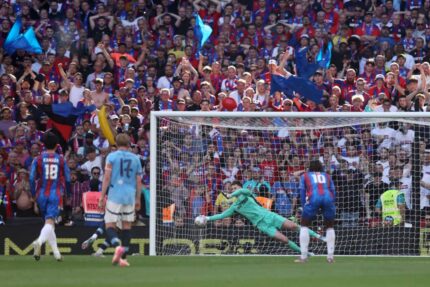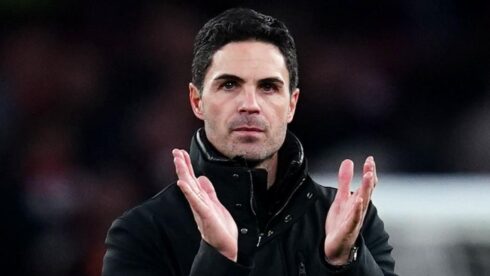The match between West Ham United and Manchester City kicked off with high intensity, as both teams were eager to set the pace. Manchester City, known for their relentless attacking play, wasted no time in asserting their dominance. Just six minutes into the game, Erling Haaland, the prolific goal machine, had his first sight of goal. A well-executed header from the Norwegian star narrowly missed the target, signaling City’s intent. West Ham, however, was not to be outdone and quickly responded with a powerful left-footed shot from Jarrod Bowen, forcing City’s defense into action.
As the game progressed, Manchester City’s tactical superiority began to show. Bernardo Silva, ever the playmaker, provided a sublime assist to Haaland, who coolly slotted the ball into the bottom left corner in the 10th minute, giving City the lead. The early goal was a testament to City’s clinical approach and ability to capitalize on even the smallest defensive lapses from West Ham. The Hammers, despite their best efforts, struggled to contain City’s fluid attack, as Kevin De Bruyne and Jack Grealish continued to apply pressure with a series of attempts that kept West Ham’s goalkeeper, Alphonse Areola, on high alert.
West Ham’s Resilience: Rúben Dias’ Own Goal Levels the Score
Just when it seemed like Manchester City was running away with the game, West Ham found a lifeline. In the 19th minute, an unexpected twist occurred when Rúben Dias, in an attempt to clear the ball, inadvertently directed it into his own net. The own goal brought West Ham level, much to the delight of the home fans, who had been anxiously watching as their team was being outplayed. This moment of fortune revitalized the Hammers, who began to press higher up the pitch, sensing an opportunity to turn the tide.
The own goal shifted the momentum slightly in favor of West Ham, as Manchester City briefly appeared shaken. Kevin De Bruyne, who had been pulling the strings for City, found himself under more pressure as West Ham’s midfield, led by Lucas Paquetá, began to close down spaces more effectively. Despite this, City continued to threaten, with De Bruyne hitting the post in the 18th minute and Josko Gvardiol seeing his header saved shortly after. The match was finely poised, with both teams showing flashes of brilliance and vulnerability.
Haaland Strikes Again: Manchester City Regains Control
Erling Haaland proved why he is one of the most feared strikers in Europe, as he restored Manchester City’s lead in the 30th minute. Once again, the assist came from a teammate, this time from Rico Lewis, who delivered a precise pass to Haaland. The Norwegian forward, with his usual composure, fired a left-footed shot into the top right corner, leaving Areola with no chance. This goal marked Haaland’s second of the match and reaffirmed City’s dominance in the attacking third.
Following the goal, Manchester City looked to tighten their grip on the game. They continued to push forward, with several attempts from Rico Lewis and Jérémy Doku testing West Ham’s defense. City’s relentless attacking waves made it clear that they were determined to seal the victory before the halftime whistle. However, despite their best efforts, including a couple of missed chances from set-pieces, City was unable to extend their lead before the break. West Ham, meanwhile, remained in the contest, hoping to capitalize on any potential City mistakes.
Tactical Adjustments and Missed Opportunities: The Final Minutes of the First Half
As the first half drew to a close, both teams made tactical adjustments in an attempt to gain an edge. Manchester City, keen to avoid another defensive mishap, began to play more cautiously, focusing on maintaining possession and controlling the tempo of the game. West Ham, on the other hand, looked to exploit any space left by City’s marauding full-backs. The final minutes of the half saw several crucial moments, including a missed header from Bernardo Silva and a yellow card for Kevin De Bruyne following a rash challenge.
The Hammers had one last chance to equalize before halftime when Mohammed Kudus found himself with a clear sight of goal in added time. However, his left-footed effort from the edge of the box narrowly missed the target, leaving West Ham trailing as the referee blew the whistle. As the teams headed into the dressing rooms, Manchester City held a 2-1 lead, but the match was far from decided. The first half had been a thrilling contest, full of action and drama, setting the stage for what promised to be an equally exciting second half.
West Ham’s Fighting Spirit Despite Early Setback
West Ham United started the second half with a change in goalkeeping personnel due to an injury to Alphonse Areola, replaced by veteran Lukasz Fabianski. The London side, trailing 2-1 against Manchester City, needed to find a quick response to level the match. However, their efforts were met with frustration as City continued to dominate possession and push forward aggressively. Mohammed Kudus came close to equalizing in the 52nd minute, hitting the post with a powerful shot, showing West Ham’s intent to challenge the Premier League champions.
Despite West Ham’s determination, they struggled to break down City’s organized defense. The Hammers were forced to settle for long-range attempts and set-pieces, neither of which yielded the desired outcome. Michail Antonio’s blocked shot in the 59th minute and Guido Rodríguez’s miss from outside the box highlighted the difficulties West Ham faced in converting their opportunities. Although they kept pushing, City’s experience and composure prevented the hosts from finding the back of the net.
Manchester City’s Tactical Mastery
Manchester City’s approach in the second half demonstrated their tactical superiority and depth of squad. Pep Guardiola’s side maintained control of the game with precise passing and well-timed substitutions that kept West Ham on the back foot. City’s offensive efforts were relentless, with Kevin De Bruyne orchestrating plays and Bernardo Silva and Erling Haaland posing constant threats to West Ham’s defense. Despite Silva’s missed header in the 49th minute, City’s persistence paid off later in the match.
The introduction of Ilkay Gündogan and Matheus Nunes added fresh legs and creativity to City’s midfield, helping to sustain their dominance. Nunes’ impact was immediate as he assisted Haaland’s goal in the 83rd minute, which effectively sealed the victory for City. Haaland’s clinical finish from outside the box underscored the gap in quality between the two sides and highlighted City’s ability to capitalize on key moments.
Defensive Resilience and Strategic Fouls
West Ham’s defense faced a barrage of attacks from Manchester City, particularly in the final third of the game. Maximilian Kilman and Emerson worked tirelessly to contain City’s advances, but their efforts were marred by costly fouls and lapses in concentration. Kilman’s yellow card in the 63rd minute for a foul on Jérémy Doku was indicative of West Ham’s growing frustration as they tried to disrupt City’s rhythm. Similarly, Emerson’s earlier yellow card and Rodríguez’s foul in the 75th minute reflected the Hammers’ physical approach in trying to regain control of the game.
Despite these challenges, West Ham’s defense managed to block several dangerous attempts, including shots from Silva and De Bruyne. However, the pressure eventually took its toll, leading to City’s third goal and diminishing West Ham’s hopes of a comeback. The Hammers’ inability to maintain discipline in critical moments ultimately proved costly as they conceded crucial free kicks and corners that City expertly exploited.
Final Moments and City’s Clinical Finish
As the game entered its final stages, Manchester City continued to assert their dominance while West Ham fought to salvage some pride. The introduction of Nathan Aké and Kyle Walker in the 88th minute added further defensive solidity to City’s backline, ensuring they saw out the game without conceding again. West Ham, meanwhile, made several substitutions in a bid to inject fresh energy, but these changes failed to alter the course of the match.
In stoppage time, both teams had chances, with Kudus’ shot being blocked and Haaland’s attempt saved by Fabianski. However, it was City’s ability to manage the game and neutralize West Ham’s late attacks that stood out. The final whistle confirmed a 3-1 victory for Manchester City, a result that reflected their clinical finishing and tactical discipline. West Ham, despite their valiant efforts, were left to rue missed opportunities and the challenge of competing against a side of City’s caliber.














